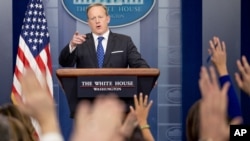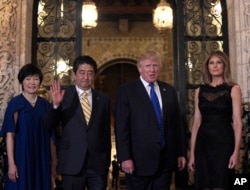White House spokesman Sean Spicer defended President Donald Trump Tuesday for labeling the press as "the enemy of the American people" and accused some news outlets of purposely reporting biased, inaccurate information.
Spicer told reporters at a White House briefing the president has "deep respect for the First Amendment (which guarantees Americans' free-speech rights) and the role of the press." However, he added, "It's a two-way street.”
"I think that the president understands that certain outlets have gone out of their way to not be completely accurate and fair in their coverage of what's going on," Spicer said.
The press secretary reviewed Trump's concern about the press in response to a reporter who asked whether the president "regrets or wants to clarify his characterization" of the news media as "the enemy," during a lengthy news conference last Thursday.
Two different views
Spicer did not cite any examples of inaccurate or unfair news coverage, but he was asked to comment on reports suggesting Trump had been careless with classified information last week, when he learned of North Korea's most recent missile test while dining in public at his Mar-a-Lago resort in Florida.
Other people dining at the same time saw a gathering of senior officials around Trump's table, consulting documents and making telephone calls. Since those present were dining by candlelight, Trump's advisers shone lights from their cellular phones to illuminate their work. Someone in the dining room posted a photograph of the unusual scene to social media.
Subsequently various news reports suggested that the president and his aides had unwisely discussed classified, sensitive issues in full view of people with no connection to the White House.
Spicer rebutted those accounts firmly Tuesday.
"It’s amazing," the press secretary said. "A photo gets put out, the president has got a piece of paper, and the immediate conclusion is he’s got to be talking about classified information."
Spicer: security was intact
Spicer said Trump had been briefed on the situation in North Korea before he entered the dining room, and that briefing took place in a secure, separate location -- a SCIF (pronounced "skiff), in government parlance, meaning a sensitive, compartmented information facility. During dinner, which included Japanese Prime Minister AShinzo Abe and his aides, the president and others discussed the logistics of a late-night statement to reporters that he and Abe had agreed to make.
"There was a question as to where to hold the press conference," Spicer said Tuesday. "They had a discussion about the logistics of it. And subsequent to that dinner, he was briefed again in a SCIF with updates on the situation in North Korea. That’s it, plain and simple."
Bolstering his initial comments about reporters' alleged inclination to distrust the president's motives and actions, or to describe them unfairly, Spicer said: "I think that it’s amazing that the immediate ... conclusion [by] several outlets was, 'Well, there’s a piece of paper; it must be classified.' "
Spicer continued: "It’s amazing to see that and to see people jump to that conclusion that he’s surrounded by his staff and members of the Japanese delegation, the conclusion is they must be doing something nefarious or wrong. in fact, [Trump] followed every procedure that’s laid out."
'Disheartening' mistrust by reporters
The press secretary said the "immediate conclusions that sombody jumps to" were "disheartening."
"So when you talk about coverage, we have a free press," he concluded. "We have the right for people to say and do what they believe. But at some point, it is incumbent upon people to try to get it right. And in that case (in Mar-a-Lago last Saturday), it wasn’t even attempted. It was a jump to conclusion by many to say that there must be something else going on when, in fact, we were able to provide a very, very clear tick-tock (a straightforward, chronological explanation) as to what had happened."
The controversy over the White House viewing the press as its foe began after Trump said in a tweet last week that the "fake news media is not my enemy, it is the enemy of the American People!” The statement represented an escalation in Trump’s long-running quarrel with the media, which he has referred to as “dishonest,” "fake” and as "the opposition party."
Past U.S. presidents have battled the news media. But rarely, if ever, has the relationship between the media and the White House been so contentious.
Veteran Washington reporter Carl Bernstein, whose coverage of the Watergate scandal in the early 1970s for The Washington Post helped bring down President Richard Nixon, has said Trump's language about the press "may be more insidious and dangerous than Richard Nixon's attacks on the press."
"But there is a similarity," Bernstein said, "in trying to divide the country and make the conduct of the press the issue, instead of the conduct of the president."
Bernstein noted critically that what he called Trump's "authoritarian attitude" indicates the president does not fully understand the role of a free press.





























